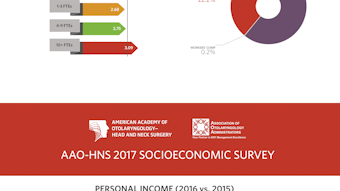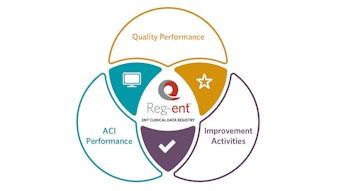Shifting the healthcare debate
As the political season here in Washington, DC, winds down, it looks more and more like there will be no significant federal legislation advanced this year that might put us on the road to viable system reforms that will facilitate affordable access to care for our citizens at a price that will not bankrupt the country. Partisanship has dominated the healthcare reform debate or, as some might say, lack of debate for too long in the United States.
 James C. Denneny III, MD
James C. Denneny III, MD
AAO-HNS/F EVP/CEO
There has been tremendous energy and resources allocated to discussions that, even if successful, would not sufficiently alter the spending curve that threatens to approach 25 percent of the GDP by 2030. To me, perhaps the most important question that needs to be answered is, how do we shift the debate to include the “untouchables” that have the power to derail comprehensive reform by their exclusion?
The transition to “quality care” is admirable and should be embraced, not as the solution to runaway costs, but on an ethical and professional basis because it is the “right thing to do” for the populace of our country. Seeking “value” is also desirable, but in the context of current discussion, will not produce the savings necessary to achieve what would be the most desirable goal, affordable healthcare services for all.
Who are the “untouchables”? How did they evolve? Why are they “untouchable,” and how can we change that and bring everyone to the table with willingness to work for the good of the whole? As the healthcare delivery system has evolved into a multi-trillion dollar behemoth, we are now reaching the “too big to fail” label that was attached to the financial industry in recent years.
The insatiable appetite for “more” reminds me of Audrey II in “The Little Shop of Horrors” film and its the repeated request “Feed me, Seymour.” What began as a universally lauded goal to improve the health of the nation by increasing access and affordability and, most importantly, advancing the science of medicine in healthcare delivery has spun out of control, driven in part by the huge sums of money being pumped into the system paired with American’s penchant for consumption and excess as promoted in our current system driven by ultra-capitalism. Capitalistic tenets including “maximize the profit,” “what the market will bear,” and “technology will lower the cost” have not proven successful to date.
Prior attempts to improve and expand the delivery system itself, while bringing costs more in line with the rest of the industrialized world, have been disappointing to say the least. Projected cost savings have not materialized and, in fact, quite the opposite is happening. Access for the middle class, employed patients has decreased with many foregoing care because of the unsupportable out-of-pocket expenses they now face. There is considerable concern that even if all of the quality and payment programs currently in use or under consideration were successful, they would not significantly alter the projected spending curve to a point that is truly affordable for this nation.
To shift the debate away from the current “finger in the dike” approach will require a philosophical change in the way we deal with healthcare delivery as a country and the willingness to participate in compromise by the group of 11 “untouchables.” Absent such a change we may well be looking at strict price controls or regulation like that seen in public utilities.
In my mind, the major players controlling the system and debate (in alphabetical order) are: ancillary service providers, attorneys, Congress, consultants, hospital systems, the insurance industry, medical device and instrument companies, Pharma, physicians, the public, and regulators at all levels. Each of these groups either has a significant stake or exists to provide the best patient care to our population. Each of these groups has developed expertise in advocating for their contribution to fulfilling the goal of maximizing patient care. Unfortunately, under the fragmented system that exists today, this has only served to inflate costs. The utopian next step would involve a collaborative gathering of these stakeholders that would all be committed to defining the reality of the situation, defragmenting the system, compromising with a willingness to alter their existing model to work for the good of the whole. Initial discussions such as these have the potential to start us on the road to give our citizens what they deserve. Next month, I will continue this discussion with an in-depth look at each of the “untouchables” and specific areas in which each group can contribute.











